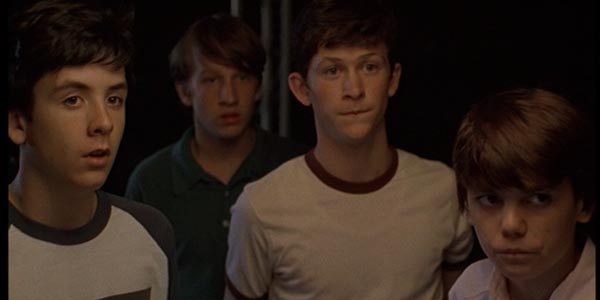A Not So Subtle Feminist Tale: THE VIRGIN SUICIDES

Michelle Sabato is an actor and writer from Cleveland, Ohio.…
Going to the movies with friends was usually rare for me. Predominately because I wanted to see the “odd” movies that my friends had no interest in. The Virgin Suicides was a film that I happened to watch on a loop when I was fourteen years old. It was provocative, depressing and strange; just a few of my favorite things! The director, Sofia Coppola, is often regarded as a female hero, due to the fact that she is one of the only female directors to work consistently and has strong female casts. Her highly anticipated film, The Beguiled, comes out in June and includes a cast of Nicole Kidman, Kirsten Dunst and Elle Fanning.
Before she was well regarded, Coppola was a first time director who adapted a screenplay from a well known book, which must have been terrifying. Luckily, The Virgin Suicides received positive reviews and has been discussed and theorized for its different themes. What I will delve into is the feminist components of the plot and how they are non conventional, yet still powerful.
The Lisbon Family Rundown
The story centers around the Lisbon family, specifically the five sisters who range in age from 13 to 17. The Lisbons live in the suburbs of Michigan and are a rather reclusive, Catholic family. The youngest daughter, Cecilia, attempts suicide by slitting her wrists but is found in time and saved. This obviously upsets her parents, who now think that they should loosen the ties on their daughters, just a little. A couple weeks after Cecilia’s attempt, they allow the girls to throw a party at their home and invite some of the neighborhood boys. During the party, Cecilia walks out and throws herself out of her bedroom window, where she is impaled on a fence post.
The reigns on the remaining daughters are tightened and they become reclusive, only leaving the house to go to school. Lux, the second youngest daughter, is asked out to homecoming later in the year by Trip, and is able to talk Mr. Lisbon in allowing her to go as long as Trip finds dates for the three other daughters. With all four sisters at the dance, Lux and Trip leave to have sex and Lux ends up missing her curfew. This was the final straw for the Lisbon parents, who now remove their daughters from school and essentially keep them all under house arrest.

Being confined, the girls are able to manage communication with some of the neighborhood boys by using different lighting cues and dropping notes. A note comes for the boys to meet the girls at their home at midnight, which the boys believe is an escape plan. When the boys arrive they are greeted by Lux, who asks them to wait for the other sisters while she starts the car. Again, the boys are thinking they are on a great escape adventure. They continued to wait, and because the house had been off limits to outsiders, they decide to explore. What they find is one of the sisters, Bonnie, hanging from the basement rafters. The boys flee in terror and realize that they are not helping the girls escape.
The following morning, the neighbors watch as the police come to the Lisbon home, where three of the sisters had committed suicide. Bonnie hung herself in the basement, Therese took an overdose of pills, and Lux poisoned herself in the garage with the car running. Mary attempted suicide, but failed this time. A month later she followed the route of Therese and overdosed on pills.
So how does any of this have anything to do with feminism, you might ask? From the brief rundown of the plot it doesn’t seem like there is anything positive for women going on. And that’s true, it’s not a positive story, but the lessons are in what’s wrong with this story.
Cecilia and Lux
None of the sisters are treated in a female positive manner, but the feminist slant is shown most in Cecilia and Lux. Cecilia is the youngest and the first daughter to commit suicide. She has the strange advantage of looking up to her older sisters and seeing what her life is going to become. Her parents don’t show any sign of changing their ways, and Cecilia is able to foreshadow a life of little substance. So she takes it into her own hands and ends her life. Now, in no way would I insinuate that suicide is some feminist heroic act. Cecilia could have rebelled and ran away from home, but that’s not the path she took. The mere fact that she made a decision to alter the life that she knew she was bound to lead is a radical stance for a young teenager. Although her life was ended, it was her decision to not allow a life given to her that was disappointing like that of her sisters.
Lux, on the other hand, does outwardly rebel in her relationship with Trip and others. She flirts with boys and does the ultimate no no in having sex with Trip. Like Cecilia, she is not willing to stand by and allow her life to be radically dictated. Lux does the very things that many girls her age do, but she suffers the consequences of her strict parents. The notion that a woman should be in charge of her sexuality is foreign to her parents; therefore they remove her and her sisters from the world, leaving the chance of slipping up again virtually impossible. Because the sisters are reclusive, when Trip shows an interest in her it means a great deal to Lux. Lux is experiencing something for the first time; she’s finally being seen and not just observed.
Narration
The book and the film are narrated by the neighborhood boys’ point of view. The Lisbon girls are an anomaly to these boys and they are determined to figure them out. Having the girls’ lives seen through these boys eyes is actually where the feminist principles take form. These boys initially see the girls as just beautiful, mysterious things. They are unattainable and it drives the boys crazy. But they are not entirely seen as human at first. Once Cecilia dies and the family becomes cloistered, the boys start to see these girls as real humans. Still, they are mysterious figures. And after all the sisters have committed suicide, the boys feel the immense loss. Only in death did the girls become totally real.

It’s as if the boys were blinded by their beauty, incapable of seeing the girls’ blatant pain and sorrow. Whether it is the boys or the Lisbon parents, the girls are always subjected to someone else’s gaze and judgement. And, as many women know, that’s par for the course of being female. The narrator is now grown and is retelling his childhood throughout the movie. Sadly, he and his friends were unable to see and understand these girls in their youth, and the allure of the girls has not changed into his adulthood.
Conclusion
While a film narrated by a man and dealing with female repression doesn’t scream “feminist content”; The Virgin Suicides essentially conveys how not to treat young women. Overall, the film shows how forcing women into a passive and submissive role can be destructive. Women are often shoved into different roles, and in the case of the Lisbon sisters they are forced to be dutiful, subservient daughters and idealized, teenage fantasies. The roles didn’t work for any of them and the lack of independence proved detrimental.
How do you think Sofia Coppola helped convey these themes? Furthermore, do you think this type of content had to be directed by a woman in order to pull these feminist themes through; or could it have been directed by a man and been as powerful?
Does content like this matter to you?
Become a Member and support film journalism. Unlock access to all of Film Inquiry`s great articles. Join a community of like-minded readers who are passionate about cinema - get access to our private members Network, give back to independent filmmakers, and more.
Michelle Sabato is an actor and writer from Cleveland, Ohio. By the age of 2 Michelle had memorized all the words to The Wizard of Oz. So, yes, she can carry a conversation with just using movie quotes.












